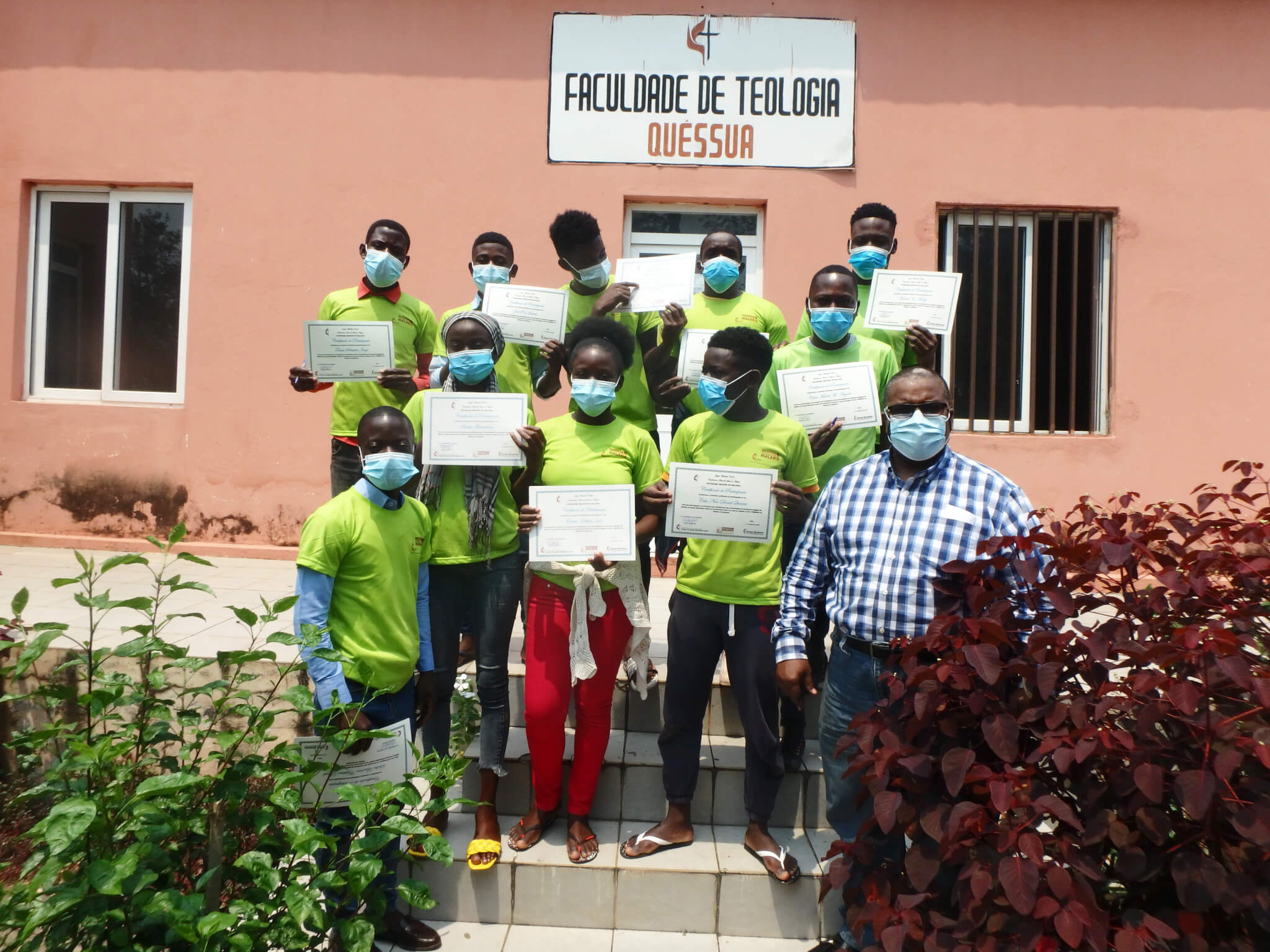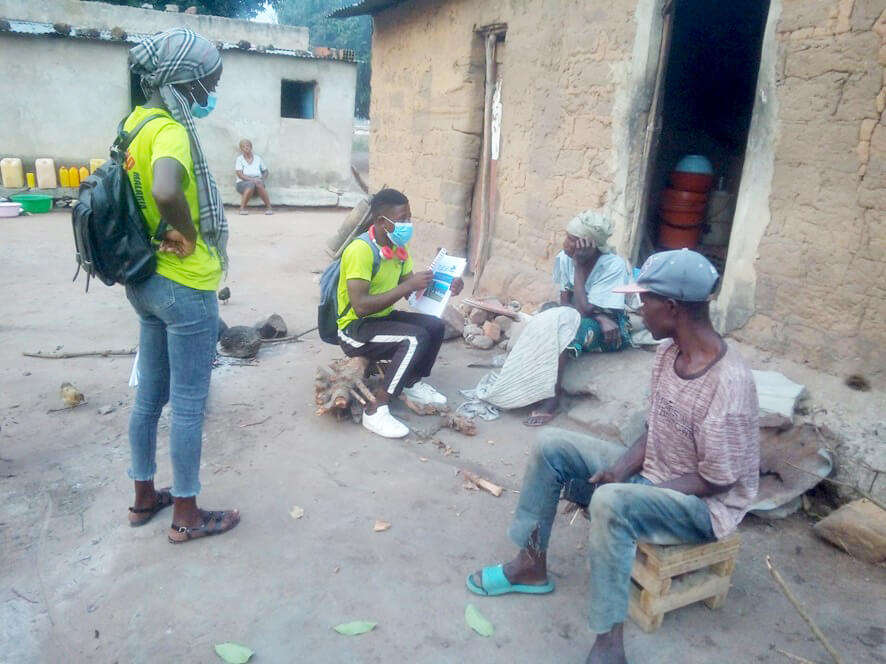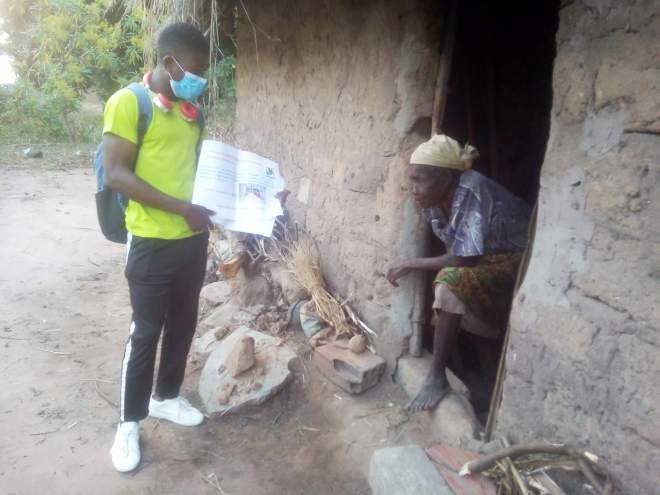
The East Angola United Methodist Health Board is on track to reduce malaria by 20% in nine communities in Malanje province in 2022. One secret of their success – teams of youth volunteers visit house-to-house to offer malaria prevention strategies.
By Christie R. House
April 27, 2022 | ATLANTA
Teresa Cassua has battled malaria most of her life. She’s cared for family members who contracted the disease and often got sick herself. In her community near the Quessua health facility in East Angola, mosquitoes are difficult to escape during the rainy seasons, when the larvae hatch and the ravenous insects constantly bite.
“I want to start by thanking the team for helping me and my community,” Cassua said to the program evaluator. “Last year, my family suffered several cases of malaria. Now, with the United Methodist Imagine No Malaria campaign, we’ve learned how to get rid of pools of stagnant water, clear bushes from around our houses and remove solid waste to reduce the presence of mosquitoes nearby.”
She was impressed by the patient Quessua United Methodist youth volunteers who shared information about how malaria is spread and the importance of sleeping under mosquito nets every night. She even decided to talk to her son about taking the training and joining the team.
Angola ranks as one of the 10 most affected countries for malaria cases and deaths in the world (World Health Organization 2020 World Malaria Report). It is the primary cause of mortality, as well as 35% of the demand for medical services and 40% of hospital admissions. The United Methodist Health Board of East Angola has steadfastly worked on prevention of, treatment for and community education about malaria since its formation in 2011.

Educating for health in Malanje
Dr. Leo Garcia, a missionary, medical doctor and pastor working with the Quessua health facility, has helped to train local facilitators – youth, young adults, community leaders and church leaders – who fan out into the villages to share what they’ve learned in group presentations. Sometimes they also go door-to-door to reach more people.
Their campaigns have good success rates, reaching almost 25,000 people in the nine communities that surround the Quessua mission. Garcia says they have seen an increase in pregnant women coming to receive prenatal care, including intermittent preventative treatment (IPT) of malaria, periodic doses of preventive medicines that reduce the presence of the parasite that causes malaria. IPT improves birth rates and the health of mothers and newborn babies.
The number of patients has increased to the point that sometimes the staff at Quessua has trouble keeping up, but recently, the addition of a mobile clinic has meant that health services can be administered in the communities, relieving some of the burden at the Quessua health facility.

Dr. Garcia’s wife, Cleivy Benitez, who is also a doctor and theological teacher, leads some of the mobile clinic teams. She discovered places where children were showing signs of severe malnutrition, another factor that weakens the immune system and increases the likelihood of serious and fatal malaria cases.
Quessua therefore developed a program to track malnutrition in the communities and provide monthly food supplements to families whose children need the extra nutrition.
The educational methods designed to train facilitators for malaria prevention can also be used with different curriculum to train for COVID-19 prevention. The East Angola Health Board has developed this training program as well, with some of the same facilitators.
Change in the community
Teresa Cassua mentioned some of the real changes she has seen as her community chose to come together to prevent mosquitoes from spreading the malaria parasite. In addition to cleaning up their environment, 92% of the patients coming to the health facility for malaria are coming earlier, with onset of their first symptoms. Bed nets are now being hung properly and used effectively in households rather than being used as fishing nets and garden covers.
Cassua commented on the passion with which the United Methodist volunteers shared their knowledge in her community. “They really love helping us change our lives to improve the whole community,” she said.
Global Ministries supplied a major grant to East Angola for its Imagine No Malaria Campaign. Chicosseno Salvador, East Angola’s program manager for malaria, coordinated the implementation with Quessua staff.
Consider a gift to Imagine No Malaria. Community by community, efforts continue to eradicate the disease and the suffering it causes worldwide.
Christie R. House is a consultant writer and editor with Global Ministries and UMCOR.

